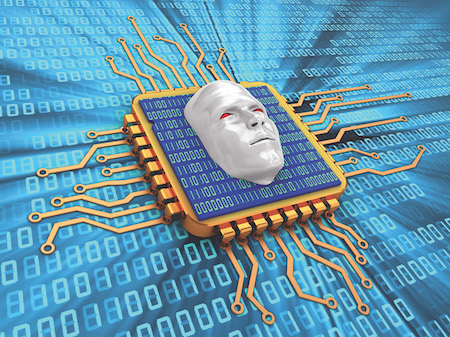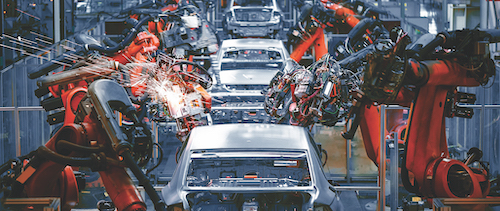Robots, being safer than people, should be treated as individuals, rather than products, in accident law. The result of such a proposal would mean that when one of Tesla or Google’s self-driving cars cause an accident – as they have already done – the car’s liability would be evaluated as a fictional person, not a product, involving a far more lenient liability framework, which Abbott argues would incentivise manufacturers to automate when it would improve safety, leading to a reduction in the number of accidents.
Inventorship
“The issue of robot inventorship has never been properly dealt with by congress or by courts, so the first step would be to acknowledge that robot inventorship is already occurring and that robot inventors are likely to become very economically important soon,” says Abbott. He argues that that we should acknowledge robots as inventors when they independently meet human inventorship criteria, because this would incentivise the creation of intellectual property by encouraging the development of creative computers.
In patent terms, an inventor is defined as individuals, meaning that companies and corporations, as legal entities, cannot be named as inventors. A patent grants its owner “the right to exclude others from making, using, offering for sale, or selling the invention throughout the United States or importing the invention into the United States”. The issue of computer inventorship is of a practical concern due to the ownership rights inherent in patents, and, as yet, computers have no such rights. In order to be an inventor, the individual must be involved in the invention’s conception, where that is defined as the formation of the idea of the invention in the mind of the inventor. It has to be a complete idea of how it is to later be applied in practice, disqualifying individuals who reduce an invention to practice from being inventors.
Creative computers are already used in the invention process, usually as a sophisticated tool, as a calculator, for example. In this sense, it cannot be described as participating in the conception of the invention, as it is defined in the patent law. However, Abbott highlights the Creativity Machine and the Invention Machine as examples of AIs that could be said to be involved in conception and be defined as inventors, as they demonstrate the same role that humans do.
Obstacles and Counter-arguments
Computers aren’t yet thought of as individuals and that means they cannot be considered inventors with regards to patent law. The language used is very specific in the law as written, designed to protect individual inventors from powerful legal entities asserting ownership, where such a dispute of ownership might arise. The other language barrier is that an invention has to be a mental act, something which is difficult to prove that a computer is yet capable of.
Abbott also says that there are non-patent incentives to create robot inventors, so robot inventors will develop even if they cannot be patent inventors. “Patents might then result in increased social costs without resulting in a significantly greater amount of innovation.”
If we don’t change the current structures to allow robotic patents, he warns that it will create uncertainty and unfairness in the research enterprise. “It will reduce sharing of sophisticated robot inventors like Google’s DeepMind and IBM’s Watson, it will make it more difficult for partners to collaborate for R&D, and it will allow individuals to claim credit for inventions they were not responsible for.”
Patent Ownership
Even should computers be recognised as inventors, there still remains the issue of who owns the patents. Abbott highlights the fact that computers are themselves owned as chattel, unable to own property, and that the possibility of “computer personhood” is unlikely to be realised. The three options for who could make a claim to owning the patents in the event of a robot or computer being the inventor are: the computer’s owner (who owns it as chattel); the computer’s developer (who programmed the AI); or the computer’s user (the person giving it tasks). It’s important to note that the developer, user, and owner can all be the same person, just as they can be distinct entities.
Abbott proposes that a computer’s owner retains ownership rights of any computer inventions. “Both because this is most consistent with the way we currently treat personal property (including computers), and because it would most incentive innovation. It would encourage computer owners to promote access to creative robots.”
Having patent ownership default to the user of the AI is problematic in that the AI’s owner might restrict access to the computer. Because there is theoretically no limit to the number of users an AI could interact with and make patentable inventions with, it would seem likely that the owner would be encouraged to limit that access; whereas if it defaulted to the owner, they would be encouraged to promote user access and allow for greater innovation.
Developer ownership is also troublesome in the issue of transferral of personal and intellectual property. When a computer makes a patentable invention and the person who programmed the software is the owner of the patent but not of the AI there would be a conflict of ownership of the AI and the patent itself.
The Legal World
Creative robots will affect the legal world too, in all sorts of ways. “As creative robots increasingly automate human knowledge-work, they’re going to compete with and displace human inventors,” says Abbott. “When the use of creative robots becomes common in research, robots may come to replace the person of ordinary skill in the art and make it difficult or impossible for people to generate ‘non-obvious’ inventions. Robots may pre-empt invention in entire fields of research.”
As for why there has been a reluctance so far to acknowledge the role a robot or computer plays in invention, Abbott argues that it is not well understood that creative robots have been inventing, that they have been doing so almost entirely independent of people, and since at least the 1990s. That it is not an uncommon phenomenon today is not recognised. “I think there has also been reluctance on behalf of the owners of creative robots to be upfront about where inventions have originated, given concerns about patentability.”


.jpg)
.jpg)
.jpg)

.jpg)
.jpg)



